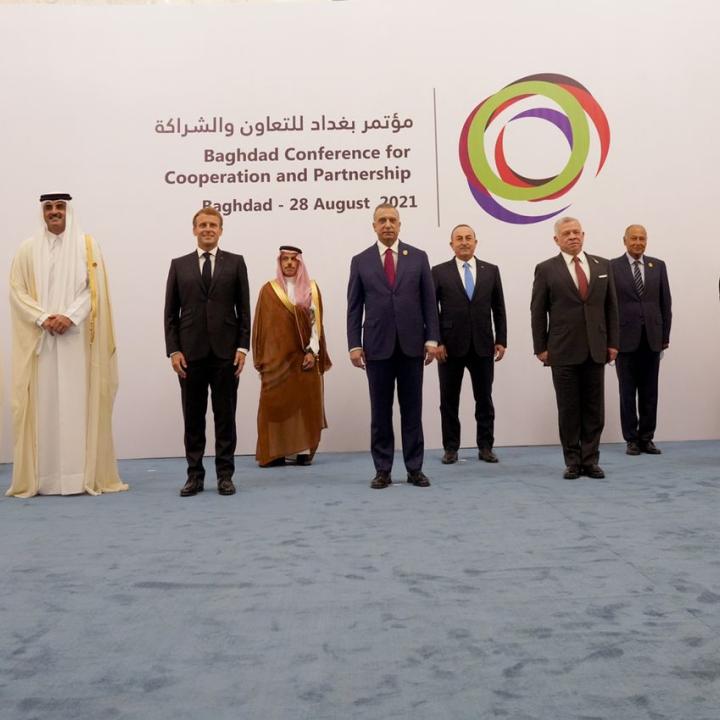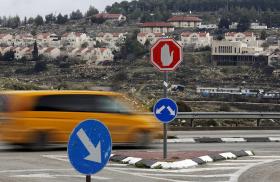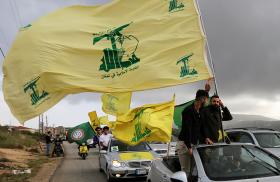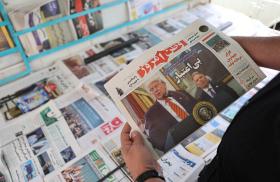

The French-sponsored event could be a welcome starting point for wider cooperation between Iraq’s new government and its Arab neighbors—particularly Jordan—but only time will tell whether agreements made there come to fruition.
On December 7, Jordan announced that it would host the second edition of the Baghdad Conference for Cooperation and Partnership. The December 20 summit brings together a multitude of regional leaders as well as French president Emmanuel Macron and representatives from the European Union, United Nations, Arab League, Gulf Cooperation Council, and Organization of Islamic Cooperation. The high-level meeting comes a little more than a year after the first Baghdad conference, but the changes in venue, political leadership, and regional context say a great deal about the organizers’ evolving interests.
Differences from the First Conference
Co-organized by France and Baghdad, the August 2021 gathering was held in Iraq and aimed at fostering regional support for the beleaguered country. Beyond the event’s relatively consensual final statement, the mere fact of gathering so many rival actors in the same room was considered a diplomatic success, with a guest list that included the president of Egypt, the emir of Qatar, the prime minister of the United Arab Emirates, and the foreign ministers of Iran, Turkey, and Saudi Arabia. Indeed, the format provided one of the rare gatherings capable of bringing together Iran and Arab countries.
The logic underpinning the initiative helped explain the unique format and turnout. The strict focus on supporting Iraq at that fraught moment—when Baghdad needed to reaffirm regional backing in the fight against the Islamic State, and amid its first parliamentary election season after months of protests and political upheaval—proved to be a consensual agenda. Yet the event’s other main goal—promoting Iraq as an area of cooperation between rival countries rather than a target of interference—has yet to be fulfilled.
Since then, Iraq’s political circumstances have once again been shaken up, and other crises have surfaced inside and outside the region, raising numerous challenges for the organizers of the current conference. Together with the new Jordanian hosts (see below), Paris and Baghdad will aim to build on the success of the first conference by expanding the number of issues on the agenda and attempting to launch concrete regional cooperation in a wider variety of sectors, including energy—albeit while keeping Iraq as the main subject. It is unclear whether counterterrorism will be discussed this time around, especially given the differing interpretations of the term by participating governments and the issue’s current sensitivity.
Maintaining the same level of representation at the second conference will also be a challenge. In addition to the original participants, the current guest list includes representatives from Oman and Bahrain, though some of the delegations may be downgraded. Observers from individual G20 and EU countries will attend as well.
A Jordan-Iraq Breakthrough
The decision to hold the conference in Amman reflects a broader expansion in the kingdom’s relations with—and calculus toward—Iraq. From a security perspective, Jordan seeks to keep jihadist elements, armed Iranian proxies, and other threats away from its eastern border. Diplomatically, it wants to perpetuate the breakthrough it reached with former Iraqi prime minister Mustafa al-Kadhimi, who substantially improved bilateral ties after years of post-Saddam relations that ranged from tepid to hostile. Amman invested a great deal of political capital in promoting Kadhimi, and a number of multilateral forums were established during his tenure, from the Baghdad Conference to the kingdom’s ongoing high-level meetings with Iraq and Egypt.
Kadhimi’s early resignation created anxiety among Jordanian officials, especially since his successor—Mohammed Shia al-Sudani—was largely unknown to them. Yet Sudani’s first foreign trip as prime minister was to Amman, allaying some of their concerns and framing the Baghdad Conference as an opportunity to build on this momentum. Continuity matters to Jordan, and Sudani seems willing to oblige. Multilateral engagements with Iraq also reinforce the kingdom’s image as a convener and a constructive regional actor.
To be sure, Amman’s approach to Iraq mainly boils down to one core goal: improving Jordan’s economy. The kingdom has suffered a series of economic setbacks due to regional developments over the past two decades, from the toppling of Saddam’s regime to the Arab Spring, the Syrian civil war, and the COVID-19 pandemic. Deepening relations with Iraq has been seen as one way to reverse these setbacks, spurring Amman to sign several bilateral and multilateral economic agreements with Baghdad in recent years—though these deals are still at varying stages of maturity. In particular, Jordan seeks access to reliable, cheap oil, in part by offering itself as a Red Sea transit route for Iraqi crude via the planned Basra-Aqaba pipeline. The two countries also launched a project to connect their electrical grids this October. And Jordan increasingly sees Iraq as an export market as well.
Sudani in Kadhimi’s Footsteps?
From Baghdad’s perspective, the conference presents significant opportunities for Sudani both regionally and internationally. His government’s proximity to pro-Iran actors is viewed with distrust in the West and among certain neighbors, so taking part in a positive multilateral event is one way of reassuring foreign backers. Sudani might also see it as an occasion to build consensus with Arab neighbors on economic relations, security cooperation, and more. The event is an especially potent model for outreach to Gulf countries, who fear the threats posed by Iran-backed militias in Iraq but also hope to pursue the country’s many investment opportunities. Tehran does not object to Sudani’s participation in the conference either, in part because an internationally isolated Iraqi government does not serve Iranian interests.
Thus far, the atmosphere surrounding the event has been rather engaging, which could benefit Sudani given his dearth of foreign policy experience. It also offers an early example of Sudani perpetuating the legacy of Kadhimi, whose personality and foreign policy accomplishments were much appreciated by France and Jordan alike. More broadly, the fact that the conference is being repeated despite the change in leadership aligns well with the idea of building bridges with the Iraqi state regardless of who helms it.
France’s Contribution to Regional Stability
Iraq has been central to President Macron’s Middle East policy. In addition to providing ample military assistance as the second-largest contributor to Operation Inherent Resolve and NATO Mission Iraq (NMI), France has lent Baghdad diplomatic and humanitarian support in the fight against the Islamic State. After the group’s military defeat, Paris engaged in stabilization efforts totaling more than 60 million euros since 2017.
In France’s view, both the 2021 Baghdad summit and this year’s Amman event are part of its “conference diplomacy” approach, which emphasizes the value of such events for enhancing regional stability and leader-to-leader relations. Given that Iraq is a major intersection for influential regional actors such as Iran, Saudi Arabia, and Turkey, French officials see it as the best starting point for easing tensions in the neighborhood (e.g., Baghdad’s relations with Ankara are currently going through an uneasy patch and could benefit from a diplomatic balm). Iraq is also a prime context for showing how international challenges such as global warming can affect the Middle East.
In this spirit, Paris has promoted the conference’s inclusive format and framed it as the beginning of a long-term dynamic geared toward tackling global challenges regionally—not only climate change, but also food security, desertification, energy security, public health emergencies, natural and industrial disasters, and more. Another sign of the format’s importance to France came earlier this month, when the Baghdad Conference was among the few Middle Eastern subjects mentioned in the joint statement issued after Macron met with President Biden in Washington.
U.S. Acquiescence So Far
In 2021, the White House welcomed the Baghdad Conference as a “successful and ground-breaking regional summit.” Indeed, U.S. policymakers seem pleased with the substance and format of both events, which fulfill an overarching goal held by Washington and Paris alike: to encourage further Iraqi engagement with Arab neighbors.
Louis Dugit-Gros is a visiting fellow with The Washington Institute and a diplomat with the French Ministry for Europe and Foreign Affairs; the views expressed herein are strictly personal. Ghaith al-Omari is a senior fellow in the Institute’s Irwin Levy Family Program on the U.S.-Israel Strategic Relationship. Bilal Wahab is the Wagner Fellow at the Institute.





